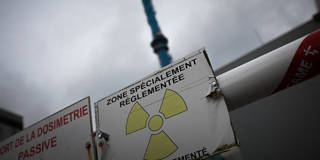Efforts by European governments to shield households and businesses from higher energy costs have obvious benefits, not least mitigating inflationary pressures. But they carry much larger costs, which the European Commission should be highlighting, rather than ignoring.
BRUSSELS – Europeans are finally getting a breather from sky-high gas prices. Thanks to declining demand by industry and households – driven by energy-saving efforts and a milder-than-usual winter – coupled with increased alternative sources, like wind and nuclear, gas prices have dropped to levels not seen since before Russia invaded Ukraine last February. But prices might rise again – and governments should let them.
Across the European Union, electricity generation and gas are inextricably linked. Gas is the most flexible fuel for thermal power stations, making it indispensable during peak hours. But it is not particularly efficient. In fact, gas requires at least two megawatt hours of calorific content to produce one MWh of electricity.
Last year, when nearly half of France’s nuclear reactors went offline, more than 50 terawatt hours of nuclear power were lost. To make up for the shortfall, some 100 TWh worth of additional natural gas would have had to be imported. With gas prices averaging over €100 ($106) per MWh – owing partly to the loss of nuclear power – the implied cost was more than €10 billion. One key reason for the recent decline in gas prices is that some French nuclear reactors have been restarted.

BRUSSELS – Europeans are finally getting a breather from sky-high gas prices. Thanks to declining demand by industry and households – driven by energy-saving efforts and a milder-than-usual winter – coupled with increased alternative sources, like wind and nuclear, gas prices have dropped to levels not seen since before Russia invaded Ukraine last February. But prices might rise again – and governments should let them.
Across the European Union, electricity generation and gas are inextricably linked. Gas is the most flexible fuel for thermal power stations, making it indispensable during peak hours. But it is not particularly efficient. In fact, gas requires at least two megawatt hours of calorific content to produce one MWh of electricity.
Last year, when nearly half of France’s nuclear reactors went offline, more than 50 terawatt hours of nuclear power were lost. To make up for the shortfall, some 100 TWh worth of additional natural gas would have had to be imported. With gas prices averaging over €100 ($106) per MWh – owing partly to the loss of nuclear power – the implied cost was more than €10 billion. One key reason for the recent decline in gas prices is that some French nuclear reactors have been restarted.